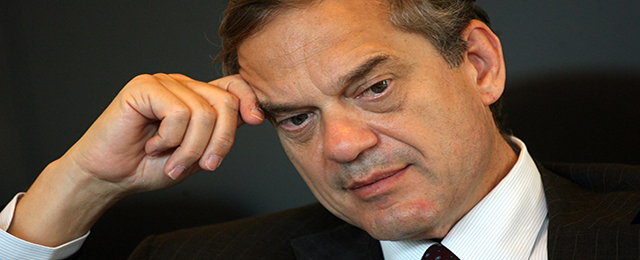-Question: Dissensions within the ECB are not new, but in recent weeks more statements than usual have been leaked. Ewald Nowotny said that the eurozone economy is “massively” weakening, and that the purchase of sovereign debt could help stop that problem. Are the Germans/Austrians in the Governing Council increasingly isolated? And is the intellectual fight really that intense?
Answer: Intellectual discussions have always taken place, and are useful. If the members of the Governing Council all thought in the same way, there would be no need for diversity. What is not useful is that they appear externally as presenting a divided Council.
-You are one of those who say that QE opponents have lost the battle. But what if quantitative easing does not fix the problem of the eurozone?
QE by itself will not solve all problems, but not implementing QE Will make it more difficult for other policies to be effective. If inflation continues to be low, other policies, in particular fiscal policy, might have to be much tougher.
-How do you explain to an overleveraged country that savings does not give returns? Where is the incentive to saving and therefore to the deleveraging?
The causality is reversed. Interest rates are low because there is too much savings. Incidentally, real inteerst rates are not low, given the environment. The best way to bring interest rates up is to get out from the low inflation environment.
– The last Geneva Report on deleveraging includes many scary figures. The eurozone is more endebted than in 2007. How do we move on?
Deleveraging requires adjustment, which is easier to implement when interest rates are low, not only at the short end of the curve but also at the long end. But de-leveraging also requires growth, which is weak in Europe. That is the key challenge, revitalizing growth.
-Italian economist Franceso Saraceno recently said: “Bini Smaghi is right. But he (as many others) keeps overestimating what the ECB can do). Fiscal policy is the answer”. What do you think? Has the ECB done everything it could?
The ECB can implement QE, in a much more aggressive way. There is no inflation, so there is room to do more. But other policies need to adjust, starting from structural policies. As far as budgetary policies are concerned, nota ll countries have the same room for maneuvre. Germany has more.
-You speak of changing the ECB’s mandate. In our last issue we interviewed ECB’s former counsellor José Manuel González-Páramo, who insisted that changing the mandate would be an “absolute mistake”. Do you think that if Germany accepted this redefinition to include growth it would accept monetary policies that it implies?
I say this because right now Berlin does not seem to feel concerned because the ECB is failing to fulfill its current inflation target. Moreover, Weidmann said that it is not a troubling problem. I don’t think that the ECB statutes should be changed. Price stability should remain the primary objective. But it could be useful to better clarify the secondary objectives, that the ECB should pursue subject to Price stability. The Statutes make a generic reference to “supporting the economic policies of the Community”. What are these policies?
-Do you think Draghi’s plan of expanding the balance sheet of the ECB by up to 1Tr is enough? What do you think of the Council refusing to speak of an specific figure?
It is a starting point. We will see in light of experience whether this will be enough. The mandate is an inflation less but close to 2%. Until that objective is achieved, the ECB should continue to inject liquidity.






Be the first to comment on "“The ECB can implement quantitative easing in a much more aggressive way”"